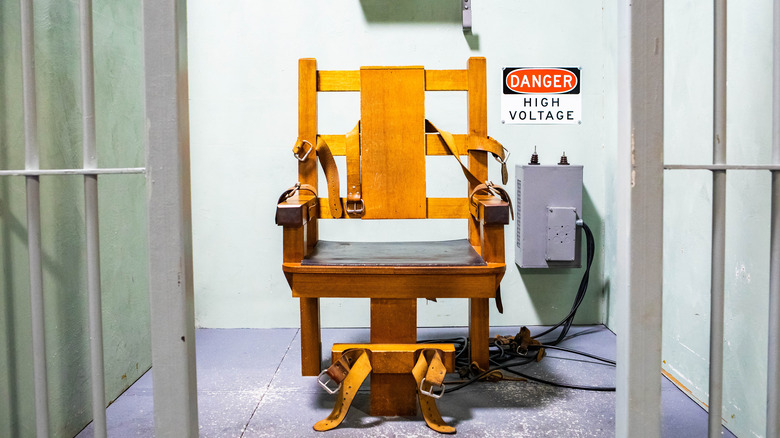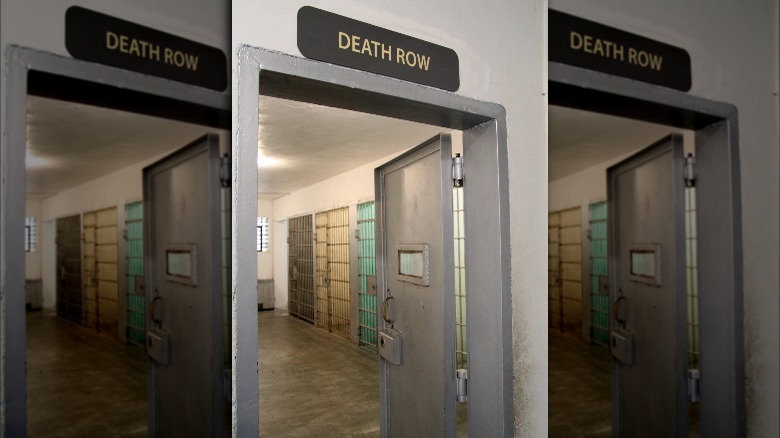Inside The Haunting Life Of A Death Row Executioner
While regular jobs allow employees to relax at home after a hard day's work, the work of a death row executioner is far more complicated. Sure, the job is done as soon as the criminal is declared dead, but some executioners keep the burden of taking the life of a person long after the deed is finished. They are expected to execute a healthy individual and carry on with their usual activities. According to a New York Times article, many executioners focus on their day-to-day routine in order to cope with their task of taking lives. Having a scheduled execution is never a good day for them, but it can be much worse, as executioner Kenneth Dean said.
As a prison officer who also does the job of an executioner, Dean said that the worst experience he had was when an inmate who was scheduled to be executed refused to go out of his cell. Dean and other officers had to wear armor and face shields to forcibly get the inmate out of his cell — an act they call "cell extraction." He said that he and other executioners he knows always question whether what they are doing is right or wrong. "Is what we do right? But if we didn't do it, who would do it?" he asked. Dean has participated in more than a hundred executions, and he said it's necessary to learn how to be detached to be able to carry out his job properly.
Execution involves a team
When executions are done — whether they are via lethal injection or the electric chair — the act is carried out by several individuals, and the prison warden is responsible for choosing a person for each task. As Robert Dunham of the Death Penalty Information Center said, "Nobody is responsible for everything" (via Vice). Furthermore, being an executioner is not a career, as there is no one individual with the sole job of taking death row inmates' lives. Those who are involved in the execution have other jobs within the prison system and are then called when an inmate is scheduled to be put to death. "What is commonly called 'executioner' is not a career," Frank Thompson, who worked as a death row warden, said. "Think of them as soldiers, in a war against crime who are sent to a tiny room to kill somebody."
Because of the nature of the job, the identities of those who are part of the "death team" are kept secret. However, there are some who choose to tell their story after they have retired. One of those is Jerry Givens, who was interviewed by The Guardian in 2013 regarding the nature of his work. Givens revealed that the execution team trains for the worst that could happen on execution day in case the inmate resists. While most executions are carried out without incident, there are instances where an inmate can get rough with the officers. They are also responsible for testing equipment and making sure everything goes smoothly.
The effects of being an executioner
Jerry Givens served as an executioner in Virginia from 1982 to 1999. During that time, he carried out 62 executions, and it wasn't an easy job for him. "I had to transform myself into someone who could go and take the life of another person," Givens said. "It's not an easy task to do." In the end, he said he regrets accepting the executioner job and he became an activist fighting against the death penalty (via The Guardian). "You can't tell me I can take the life of people and go home and be normal," he said.
According to Think Progress, those involved in the execution process are likely to suffer from post-traumatic stress disorder and experience nightmares and flashbacks. According to statistics, 31% of prison staff involved in executions report having symptoms. Experts say that it is common for executioners to experience this after taking the lives of inmates as it goes against their morals. Fred Allen, an ex-executioner, experienced a breakdown years after he stopped working in prison. He was at his new job and all of a sudden, all the executions that he participated in came rushing back to him. "Something just triggered in me and I started shaking ... And tears, uncontrollable tears, were coming out of my eyes," he said (via News.com.au). In the last decade, several states have abolished the death penalty and replaced it with life imprisonment without parole. Presently, 27 states still authorize executions.


